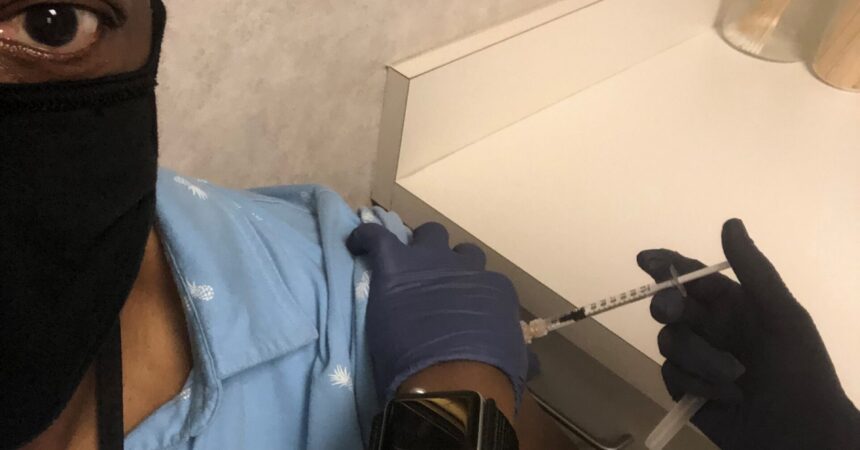
Focusing on Blacks
Grass-root group intensifies push for vaccination sites

Photo by Van Wilson
By St. Clair Murraine
Outlook staff writer
Right around the time in December that the first doses of vaccines to fight off COVID-19 were being dropped off in Leon County, a grass-root group began setting the stage for getting Blacks to get vaccinated. So far the work of the Statewide Coronavirus Vaccination Community Education and Engagement Task Force has discovered that the challenges are many.
The group focused its attention on Blacks in Leon County and the rest of the state, expressing astonishment about the how low the vaccination numbers are for people that the disease has disproportionately affected. Leon County Health Department data shows that only 8 percent of Blacks have gotten the first dose of the vaccine as of last week. By comparison, 60 percent of just over 25,000 Leon County residents who have been vaccinated during the same time are White.
Claudia Blackburn, Administrator for Leon County Health Department, told the group that 1,314 Blacks have been vaccinated in the county as of last Wednesday. The number includes those who work in nursing homes.
“In the Black and brown community, those numbers are unacceptable,” said Rev. RB Holmes, who chairs the task force. “We must do better.”
Making the vaccine more accessible to Blacks was a lengthy topic of discussion during a task force virtual meeting last Wednesday. Some of the suggestions include purchasing a mobile unit and using church buses/vans for getting into Black communities where residents don’t have the means to travel to vaccination sites.
Meanwhile, the city has agreed to offer free Star Metro rides to vaccination sites, said Elaine Bryant, director of the task force.
Reiterating its plans to establish satellite health centers in four regions around the state, the task force said churches and community centers in Black neighborhoods along with the state’s four HBCUs are ideal vaccination sites.
“Site locations are extremely critical in terms of our ability to get out into the community where people are,” Bryant said.
Since the vaccine was rolled out in Florida, distribution, accessibility and availability have been among the major concerns in Black communities. Bond Health Center can be a help in those areas, said Dr. Temple Robinson, CEO at Bond. Federally Qualified Health Centers are community based with a majority of patients who are the people that the group wants to reach, she said.
Robinson also said vaccinating some individuals could require going to their homes, something that Bond is willing to do. Churches volunteering their buses and vans could be one way of making the house calls on people who don’t have the means to travel to a vaccination site.
Judy Mandrell, co-pastor at Life Changers Church of God in Christ, expressed a willingness to assist with transportation.
“I believe that we will give our vans, we will give our busses to go on those dirt roads (and) those muddy roads to go and save the lives of our people,” she told the group.
FAMU, where a COVID-19 testing site has been set up at Bragg Stadium since last April, is prepared to be a venue for giving the vaccine, said Cynthia Harris, Associate Dean and Director Institute of Public Health.
“We have already seen through Bragg that FAMU is home and we can really do well in addressing the disparities in numbers that we see,” Harris said. “Florida A&M wants to address that disparity.”
Ultimately the group wants to attain a 60 to 70 percent herd immunity among people of color. Although experts aren’t sure exactly what percentage of vaccinated individuals is required to reach herd immunity, it’s known that attaining that plateau would make it difficult for the disease to spread.
Statewide the number of Blacks age 65 and older only represent 4.9 percent of those who were first to take the vaccine. Blacks make up 9.2 percent of the state’s 65 or older demographics.
About 1.8 million vaccinations had been administered in Florida through last week. That total includes 1.1 million people ages 65 and older who received shots, according to the Florida Department of Health.
Among the recommendations that the group discussed were educating and informing people about dissemination of information about the vaccine. Plans are in the works to roll out a website with updates on the vaccine, the group said.
Whatever information goes out has to be clear to help eliminate distrust that Blacks might have about the vaccine, Robinson said.
“Tell the truth so people know what to expect so we don’t continue to reinforce the distrust of medicine,” she said. “… not frighten people. Just tell the truth.”
Meanwhile, the state took a major step to get people vaccinates, rolling out a website to pre-register for COVID-19 vaccinations last Friday. Through the website (MyVaccine.FL.Gov) Floridians can sign up for vaccinations in the counties where they live.
While the website noted that doses of the vaccine arriving in Florida are limited, the state recently received another batch last week. The limitations on availability of the vaccine have caused some frustration, especially among people 65 or older, but Blackburn has been asking for patience.
“We’re in a situation right now where there are many more who want to get the vaccine —and who are eligible for it— than there is vaccine to meet the need,” Blackburn said in a statement. “Our plan in Leon County is continue working with our partners to try to get as much vaccine as we can and administer it as rapidly and as safely as possible.”







